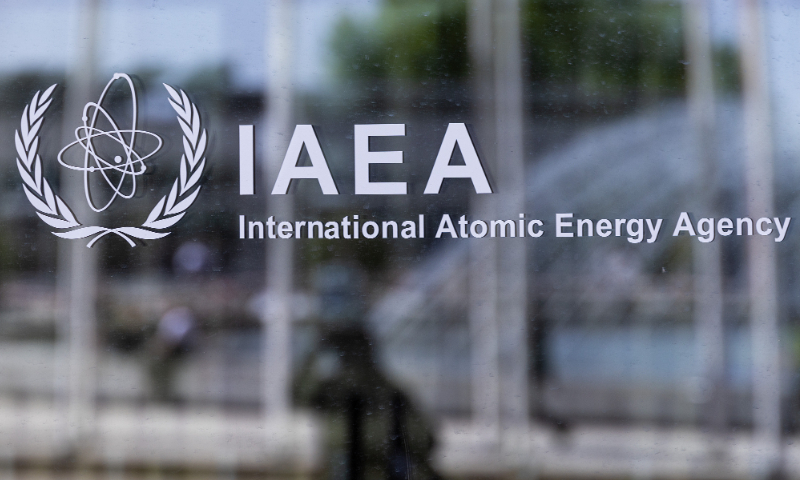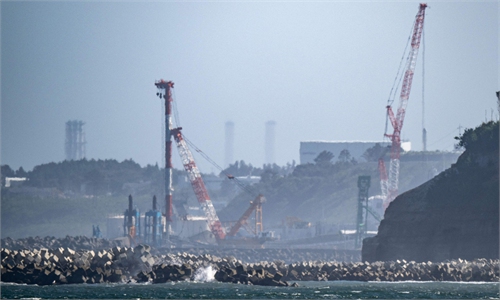IAEA director's visit to Japan widely questioned, seeks to downplay nuclear water dumping

IAEA Photo: VCG
Rafael Grossi, director general of the International Atomic Energy Agency (IAEA), said during his visit to Japan that he confirmed that the "treated water" in Fukushima fully meets international standards, and experts believe such remarks supporting the discharge have become a kind of "political security" reached between the Japanese government and the IAEA.
Grossi was in Japan visiting the site of the nuclear power plant for the first time since the water dumping began. He also attended a meeting in Fukushima where representatives of the government and fishing communities discussed the current situation, according to Kyodo News.
He supported Japan's decision once again, saying, "Our corroboration and information and also independent sampling have confirmed the very low presence of tritium ... In some cases even impossible to trace, which means that the process is working as we thought it will be. So in this regard, it is correct. We are satisfied."
According to the Japanese newspaper Mainichi Shimbun, Japanese Prime Minister Fumio Kishida and Foreign Minister Yoko Kamikawa separately met with Grossi, confirming continued cooperation on the issue of the discharge. The Japanese side announced that they will provide approximately 18.5 million euros ($20 million) in assistance to the IAEA.
The Chinese Embassy in Japan responded on Thursday that the Japanese side's forced implementation of discharging nuclear-contaminated wastewater into the sea has no precedent since the peaceful use of nuclear energy by humans, nor are there any recognized disposal standards. How can it be said to comply with so-called "international standards?"
The nuclear-contaminated wastewater generated by the Fukushima nuclear accident contains various radioactive nuclides present in the melted core, many of which do not have effective treatment technologies. Focusing solely on tritium clearly ignores this basic fact. Relevant parties, including China, have taken corresponding preventive and response measures against Japanese aquatic products to safeguard food safety and public health, which are completely legitimate, reasonable, and necessary, with ample scientific basis, the embassy said in a statement.
China once again urges the Japan to address the reasonable concerns seriously and honestly at home and abroad, and to promptly cooperate in establishing a comprehensive, effective, and independent long-term international monitoring mechanism involving all relevant parties to responsibly and constructively handle the nuclear-contaminated wastewater, it noted.
The IAEA should uphold the principles of objectivity, professionalism, and impartiality, and should not endorse Japan's erroneous actions of discharging nuclear-contaminated wastewater into the sea, nor should it disseminate one-sided information that misleads international public opinion, the embassy stressed.
Since Japan announced the start of the dumping plan in 2021, the IAEA has consistently shown a tendency to support the actions of the Japanese government, Zhang Yanqiang, a professor of law of the sea studies at Dalian Maritime University, told the Global Times. The IAEA has issued multiple reports trying to prove that the discharge of nuclear-contaminated water "meets international safety standards," all of which have conveyed a signal that the IAEA will continue to endorse Japan, which is regrettable, Zhang said.
"With the internal management chaos of Tokyo Electric Power Company and inadequate government supervision in Japan, in a situation where standards are unclear, boundaries are unclear, and data is not transparent, no one or organization can guarantee that the nuclear-contaminated wastewater being discharged into the ocean by Japan is safe," Zhang said.
Experts said that as an independent intergovernmental international organization within the United Nations system, the IAEA should strive to promote the establishment of substantive, independent, and effective long-term international monitoring arrangements involving Japan's neighboring countries and other stakeholders with vested interests.
It should urge Japan to handle the nuclear-contaminated water responsibly and constructively, rather than just engaging in communication with Japan, experts said.
Yoshitaka Ikarashi, a resident at the Fukushima Prefecture and the representative of Japan-China Association for Promoting Friendship in Japan, has been dedicated to the post-disaster reconstruction of Fukushima since the earthquake. In an interview with the Global Times on Thursday, he stated that the plan to discharge Fukushima's contaminated water into the sea will last for 30 years. However, since the first round of discharge, it has been less than seven months, and the IAEA has expressed "satisfaction" with the discharge situation. Or, it can be said that this is a kind of "political security" reached between the Japanese government and the IAEA.
Ikarashi said anti-discharge activities in Japan are still ongoing. Residents of Fukushima hope the Japanese government will seriously consider the lives and health of its citizens and not confuse science with politics, he said.

